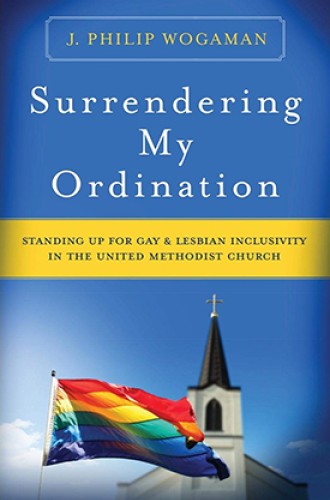An act of solidarity with LGBTQ Methodists?
J. Philip Wogaman tried to surrender his ordination. Would this have helped?
In this memoir, J. Philip Wogaman attempts to concisely explain both (1) the nature of the United Methodist Church’s increasingly partisan encounters with the reality of lesbian and gay people’s existence, as well as (2) how he decided the most pastoral thing he could do at a moment of crisis would be to refuse his pastoral role. Contextualizing the UMC’s almost 50-year clash in less than 110 pages would be no small feat for any author, let alone a man trying to speak to colleagues outside as well as inside his denomination. Wogaman seems most interested in appealing to the sensibilities of other pastors in order to convince them that to surrender one’s credentials is in itself a Christian act that honors the church.
His justification for his deed is based on his understanding of what ordination (and implicitly, ministry) is: “An ordained minister is called to be a representative of the church, which represents Christ, who represents the God who is in all, and through all, and above all.” Tracing his 60 years of learning how to pastor in varying roles and contexts and at different levels of maturity, Wogaman describes an essential call to discipleship. Having served in several capacities as an ordained minister—teaching seminary students, participating in activist subgroups, serving on boards and committees within the denomination, and pastoring a prominent church in the nation’s capital—Wogaman shows himself as dedicated to his profession and call. He seems convinced that readers will understand this sense of calling and affirm his efforts to fulfill it.
As he tells stories to demonstrate his dedication to the responsibilities of discipleship, Wogaman also tells of his increasing recognition of the humanity of gay people, despite common rebuttals across denominations. “To be a pastor is to reach out and help people find fulfillment in their life journey . . . to be at one with fellow humanity.” As he recognized the hard-heartedness of his denomination toward gay folks with obvious spiritual gifts and talents, the question of how he could fulfill his pastoral responsibilities increasingly weighed on his conscious and practice.






